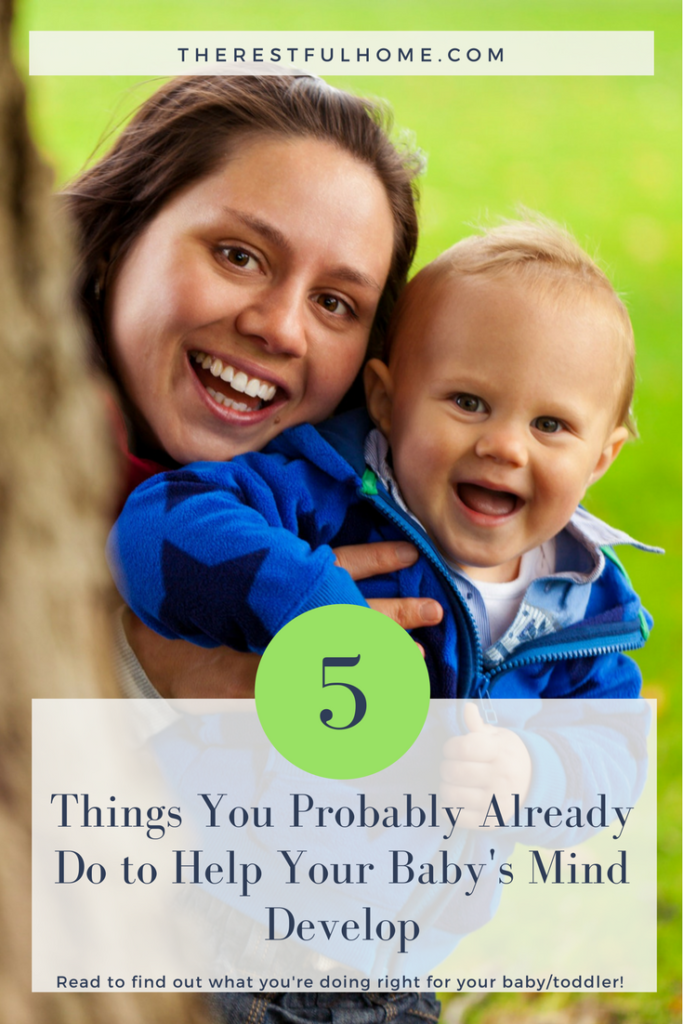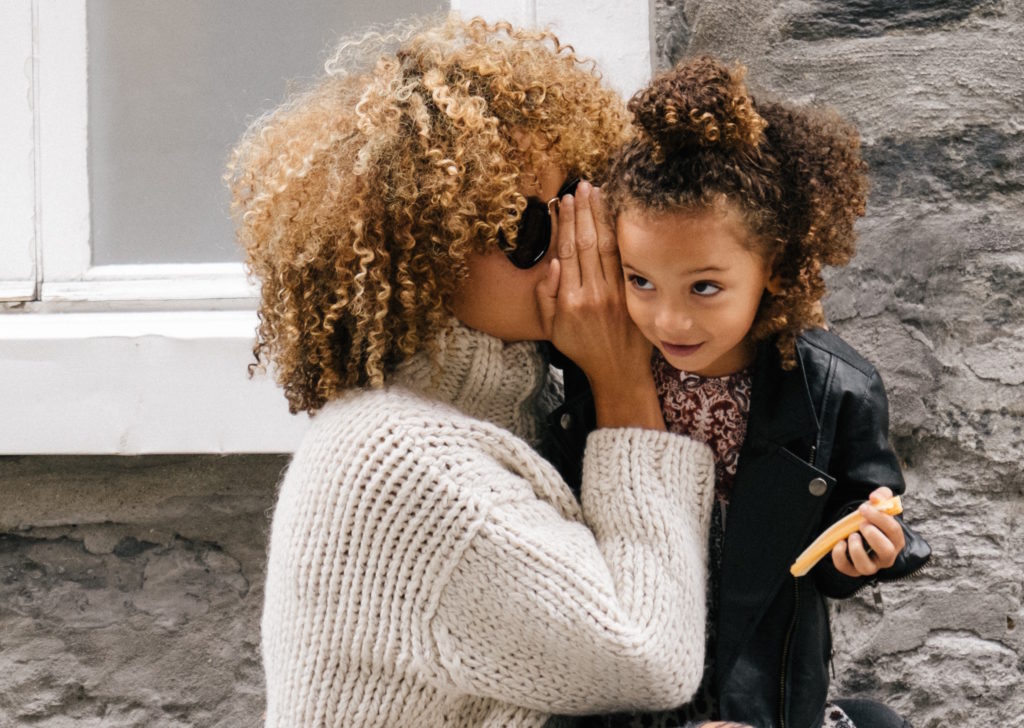
Many doctors and scientists agree that the first 5-7 years can be the most crucial to your child’s development. Many would even say that the first three years are the most important for language and brain development (although there isn’t consensus on that, as this review expresses). Synapses form rapidly during this time, connecting nerve cells. That means your baby learns a LOT during his/her first few years. I began researching and found 5 things you probably already do that help your baby’s mind grow and develop.
How to Help Your Child’s Mind Develop: 5 Things You Probably Already Do
-
Talk to your toddler.

Photo by London Scout.
Talking to your toddler sounds like such a basic thing to do. But, honestly, sometimes I get bored of playing with my little guy. On those days, I’d rather quietly read or cook as he plays. Reading the research on the importance of baby-directed speech, though, has helped remind me to keep my stream of talk flowing! 🙂
Children know when you’re talking to them, not just talking to others while they’re in the room. And kids who are spoken to often will develop a much bigger vocabulary at a much earlier age, research shows. Adriana Weisleder, a research psychologist, summarized one of Stanford’s language-focused research projects like this:“Mere exposure to speech directed to others or on TV is not enough to drive early vocabulary development. Toddlers learn language in the context of meaningful interactions with those around them.”
During this particular project, they put microphones on toddlers’ shirts to record all the speech around them. Children whose moms spoke to them directly (one received 12,000 words of child-directed speech) had a much greater speech ability by 24 months old than those who weren’t spoken to often. (One only heard 670 words a day directed toward him—“67 words per hour, less speech than you’d hear in a 30-second commercial,” notes Anne Fernald, one of the Stanford psychology research team.)
Reading about this experiment made me realize that, although I speak often to my son, I should speak to him even more and about a wider range of topics, even though he may not understand it all right now.
-
Sing to your baby.
Kimberly Moore, writing for Psychology Today, suggests that the songs you sing to help your baby sleep may be his/her first language lesson. When I sing to my baby, he often encourages me by bouncing in place, grooving to the music. If you have trouble singing by yourself, here’s some music to sing along with that might get you started.
-
Read regularly to your baby.
Photo by Matthew Henry.
According to many researchers, almost nothing helps your toddler’s or baby’s mind more than reading aloud to her.I enjoy reading to my child, just because it gives us something fun to do throughout the day. So it’s exciting for me to see that reading is so incredibly helpful to babies and toddlers.
* Second, it also teaches them the normal intonation/rhythm of reading aloud. Later, when they learn to read, they’ll be better prepared for reading aloud to you or their teachers.
* Third, when kids see you enjoying reading (to them or on your own), they are more motivated to learn how to read when that time comes.
* Finally, just like with speaking, reading increases VOCABULARY! A child’s vocabulary is much larger when he is read to regularly. Part of the reason for that may be that writers use a larger vocabulary than most people regularly use in daily life. -
Replace screen time with unstructured playtime.
Most of us have probably heard that TV before 18 months old is probably not helping our kids. We’re trying to keep TV watching to a minimum, and (I hope) we’re not bringing out iPads as early as parents were five years ago. I’ve already written just a little bit about some of the research on the negative effects of too much screentime on our babies, in my comparison of Montessori/Waldorf. While I’m not ready to get rid of my high-tech LG washing machine (yes, it has a screen) or most of my other modern-day appliances, this is a case where going back in time is a good thing.
Ditch the iPad, the TV (even if it’s just playing educational shows), and all the other little flashing items, recommends the American Academy of Pediatrics. Let your kids play in the dirt, make a mess (yes, I know from experience this is really hard for a first-time mom!), and use their imaginations.
So what if your baby is super bored with all his toys and it would be great to turn on Sesame Street? What would be more helpful for baby’s mind? Buying him more toys? Not necessarily! 🙂
With Baby J, rather than buying him a new toy whenever he’s bored of the ones he has, we usually give him a household item to explore. Our trash becomes his treasure, literally. Empty Altoid box? He thinks it’s the best thing he’s ever seen. Mini hotel dish soap bottle? Leave just a few bubbles inside, and he’ll shake it around for a good 15 minutes. Unless it’s an item we use ourselves (like wooden spoons or containers), we’ll just throw the item away once it’s broken or he is no longer interested.
Playing with things you already have on hand = lots of fun for little cost! Photo by Lubomirkin.
An exception to screen time is video-chatting with loved ones, because then the person on the other side of the screen is able to interact with your little guy. Interaction is what makes your baby’s mind produce meaning out of the screen time. -
Keep up the ABC-work!
All this talk about unstructured play doesn’t mean we should forget about having a structured
These are Baby J’s beloved alphabet cards, given to him by a sweet neighbor lady! You can find them here, on Amazon.
lesson time once our babies become toddlers. With the exception of a few very smart children, most kids need repetition of ideas to learn new things. But lesson-time/preschool shouldn’t look like the boring desk-and-textbook that comes to some of us when we think of school. Kids love your attention, whether you’re Mom or Daycare Lady. That can translate to “learning time means fun with Mom!”
Even my one-year-old frequently drags his bag of squishy alphabet cards over to me so we can go through them one by one. He tires of it about halfway through, so sometimes we start with Z and work backward. J According to Margaret Burchinal, a senior research scientist at the Frank Porter Graham Child Development Institute (FPG) at the University of North Carolina (Chapel Hill), in preschool-teaching “more focus on scaffolding and intentional teaching is needed.”
What’s scaffolding? Scaffolding is just teacher-talk for helping your kid with whatever is just a little too difficult for him. Not doing everything for him, but giving an occasional boost with the information he needs to succeed.
Are any of these new ways to stimulate your baby’s mind?
Not at all! Most of us are probably already doing these things for the little people in our lives. However, it’s encouraging to find out that the things you do almost instinctively are helping your baby’s mind grow and develop so much!
